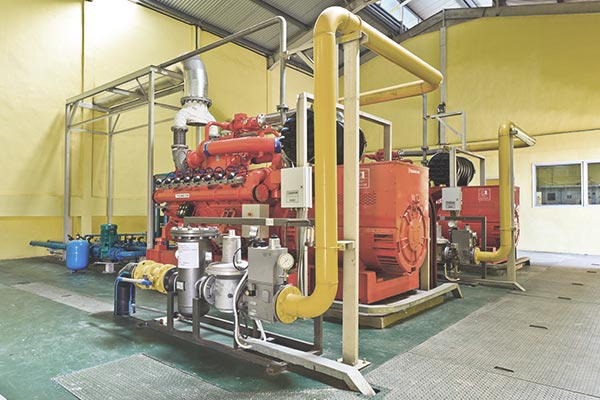RENEWABLE ENERGY
Biogas Power Generation Plant
Mistral, a wholly owned Malaysian subsidiary of Timah, is principally engaged in the business of renewable energy generation. Mistral operates a Biogas Renewable Energy Plant (“Plant”) in Malaysia with nominal export capacity of up to 3.5 Megawatt (“MW”). The Plant uses Palm Oil Mill Effluent to produce Methane Gas, which is then used as fuel to run Gas Engines to generate green and renewable energy.
The Plant is located at Km 63 Jalan Sandakan, Sandakan in the State of Sabah, Malaysia, and next to Prolific Yield Palm Oil Mill owned and operated by Cepatwawasan Group Berhad with a processing capacity of 90 Metric Tons of Fresh Fruit Bunches (“FFB”) per hour.
Previously POME from this Mill was treated in a conventional open lagoon system with the biogas produced being emitted to the atmosphere. The Biogas Plant provides more efficient and controlled treatment of POME, whereby methane is captured and converted in gas engines into electricity.
On 9 February 2015, Mistral has obtained the Feed-in Approval from the Sustainable Energy Development Authority Malaysia (“SEDA”) to supply electricity to the national grid at the Feed-in Tariff rate.
Mistral has entered into a Renewable Energy Power Purchase Agreement (“REPPA”) with Sabah Electricity Sdn Bhd for a period of 16 years.

Biogas
Technology
Mistral’s Biogas Plant is a showcase of how biogas renewable energy can be harnessed sustainably from palm oil mills in Malaysia.
The Biogas Plant employs an efficient biogas digester system based on thermophilic digestion, which harnesses methane generated during anaerobic digestion of POME. The system involves primary and secondary digester tanks with flexible membrane roofs for controlled thermophilic digestion.
The captured biogas or methane is utilised for power generation in gas engines. Biogas that cannot be utilized for energy production is flared in a closed flare system. Treated wastewater from the Biogas Plant undergoes further treatment in an effluent polishing plant and the sludge is then used for soil application.
Emission
Reduction
The production process of biogas contributes to Greenhouse Gas emission reductions via:
-
Recovery of the methane gas generated from decomposing organic matters (or anaerobic digestion process involving microorganisms called anaerobe) instead of being emitted to cause harm to the atmosphere.
-
Usage of the recovered methane gas for renewable electricity and heat generation.
Environmental
Sustainability
The Biogas Plant:
-
Introduces an efficient and controlled treatment of agriculture waste in contrast to the open lagoon system.
-
Minimises risk of POME flooding and leakage into waterways.
-
Reduces atmospheric emissions of methane gas and strong odours as the gasses are captured.
Capturing and utilising the biogas is in line with the Malaysian Government’s policy to intensify the development of Renewable Energy as the fifth fuel resource under the country’s Fuel Diversification Policy, as stipulated in the objectives of the Third Outline Perspective Plan for 2001-2010 (OPP3) and the Tenth Malaysian Plan.
